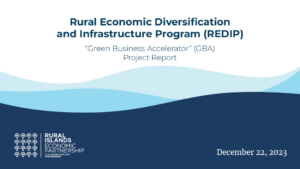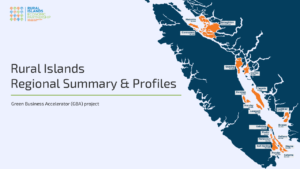In mid-December, RIEP completed Phase 1 and 2 of our Green Business Accelerator (GBA) feasibility study, a research project funded by the Rural Economic Diversification and Infrastructure Program (REDIP), via the Ministry of Jobs, Economic Development and Innovation.
Working in close collaboration with research partner CTRS, our staff team spent the second half of 2023 designing and deploying research questions focused on engaging with business owners, operators, workers and community volunteers in BC’s rural island communities about ‘green business’. Our intention was to learn about levels of awareness, knowledge, support for clean, regenerative and circular practices, and the ability for businesses of all sizes—across BC’s network of 18+ rural island and Indigenous communities—to adopt and embrace such practices as part of everyday business.
The GBA study also captured feedback about green business practices that have already been adopted, concerns about or barriers to future adoption, and—perhaps most importantly—provided an economic snapshot and profile of our rural islands as a collective region.
To our knowledge, this is the first time there has been an intentional, coordinated and collaborative engagement to obtain evidenced-based data about the islands as a region, and as communities. Initial results from the study also informed our understanding of ‘what green business’ is according to rural island and coastal community residents, along with ideas from residents about potential new or enhanced programs or services that would be most relevant to rural-remote coastal workforce development, business development.
The most exciting aspect of these research outcomes is the potential impact they can have, as recommendations from both ‘the people on the ground’ as well as our team of research experts, as to how best to support industry sector development, retention, and expansion, while mitigating the impact of economic activity on our precious, natural ecosystems.
The RIEP Board is now considering the GBA research recommendations, and the potential for designing one or more programs to build on the recommendations. Our ultimate objective is to undertake business planning that might result in on-the-ground delivery of impactful, clean and green initiatives to support island businesses, and which would be considered for future funding by partners like the provincial and federal governments.
We’re grateful to every rural island and coastal community resident who participated in the study, and invite everyone to see highlights from the study.
There’s more to come! Over the coming months, the RIEP Board of Directors will consider the recommendations, review the options for designing one or more new programs for RIEP to consider championing in 2024 and beyond, and build business models for bringing new programs to BC’s rural islands and coastal communities to support and grow green business practices into the future!
Want to get involved? Email our Board Chair for more information.


